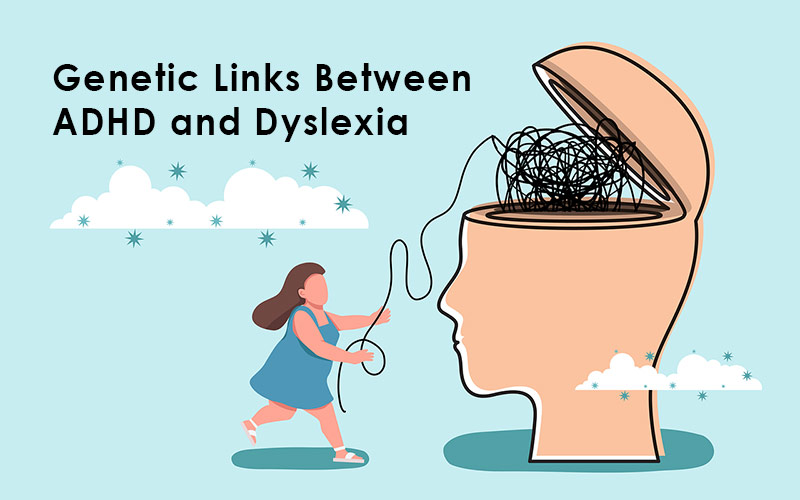Recent research from the University of Edinburgh has shed light on the genetic overlap between two of the most commonly co-occurring learning disorders: ADHD and dyslexia. In a groundbreaking study, scientists have identified 174 shared genes between the two conditions, providing deeper insight into why individuals often experience both simultaneously. This discovery marks a significant step in understanding the biological mechanisms behind these learning disabilities, which could lead to more targeted treatments and interventions.
Table of Contents
ToggleADHD and Dyslexia: A Genetic Intersection
ADHD (Attention-Deficit/Hyperactivity Disorder) and dyslexia are distinct but frequently co-occurring neurodevelopmental disorders, with each affecting different aspects of learning and behavior.
ADHD is characterized by symptoms such as inattentiveness, hyperactivity, and impulsivity, while dyslexia primarily involves difficulties in reading, spelling, and processing language. Despite these differences, researchers have long suspected that the two conditions share common underlying factors—and the findings at the University of Edinburgh confirm that suspicion.
The research team analyzed genetic data from thousands of individuals, focusing on genetic markers associated with both conditions. Their analysis identified 174 genes that are linked to both ADHD and dyslexia, suggesting that these disorders may be driven by some of the same genetic pathways. This overlap could explain why these conditions frequently occur together, with nearly 40-60% of people diagnosed with one disorder also having the other.
Common Symptoms and Misdiagnoses
The overlap between ADHD and dyslexia can also complicate diagnosis and treatment. Parents and educators may mistake dyslexia symptoms for ADHD or vice versa due to the similarity in how these conditions affect cognitive functions. Both disorders can result in slower processing speeds, working memory challenges, and motor skill deficits. This can lead to misdiagnosis or delays in getting the proper intervention for a child.
In children with ADHD, their impulsivity and inattention can mask the more subtle reading difficulties associated with dyslexia. On the flip side, a child struggling with dyslexia may seem inattentive in the classroom, leading educators or parents to suspect ADHD. Understanding the shared genetic and symptomatic foundation of these disorders can help professionals make more accurate diagnoses.
This interaction can create a vicious cycle. Children with both ADHD and dyslexia may find themselves unable to keep up with schoolwork, leading to frustration, low self-esteem, and behavioral issues. Early and accurate identification of both conditions is therefore critical to ensuring that individuals receive the right support and intervention strategies tailored to their unique needs.
Implications for Treatment and Support
This discovery of overlapping genes opens up new possibilities for treatment. While current treatment approaches for ADHD and dyslexia are tailored to their individual symptoms, this research suggests the potential for more integrated therapeutic strategies in the future. For instance, interventions targeting shared cognitive deficits, such as working memory or information-processing speed, could benefit children with both ADHD and dyslexia.
In the future, genetic testing could become a part of routine assessments for children showing signs of either ADHD or dyslexia, allowing for better differentiation and targeted interventions. Additionally, these findings may open the door to new treatments that address the root causes of both conditions, rather than simply managing symptoms.
What Does This Mean for Parents and Educators?
The University of Edinburgh’s research offers a clearer picture of the complex relationship between ADHD and dyslexia, but it also raises new questions about how these conditions develop and interact. Further studies are needed to explore how environmental factors, such as early childhood experiences and educational support, interact with these genetic predispositions.
Conclusion
The discovery of 174 overlapping genes between ADHD and dyslexia marks a significant milestone in the field of neurodevelopmental research. This new genetic insight helps explain why these two conditions often appear together and how they exacerbate one another’s symptoms. With this knowledge, scientists are hopeful that future interventions can better address the challenges faced by individuals with both ADHD and dyslexia, improving their quality of life and academic success.
The road ahead is promising, as ongoing research will continue to explore how these genetic links can inform better diagnostic practices and more effective treatments. Ultimately, this study brings us one step closer to unraveling the complex relationship between ADHD and dyslexia, providing hope for those affected by these conditions.
For parents and educators, this research underscores the importance of understanding the complexity of learning disabilities. Children with ADHD or dyslexia may struggle in multiple areas of learning, not because they lack intelligence or motivation, but because their brains process information differently.
Being aware of the potential overlap between ADHD and dyslexia can help parents advocate for comprehensive evaluations if they suspect their child may have one or both conditions. Educators, too, can benefit from this knowledge by creating more inclusive classroom environments and using teaching strategies that support children with diverse learning needs.
Source: MedicalXpress – Genetic Links Between ADHD and Dyslexia
Image by Rosy / Bad Homburg / Germany from Pixabay


